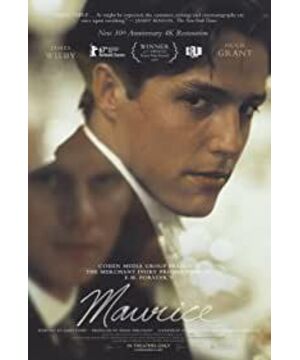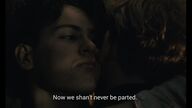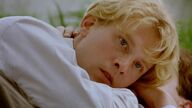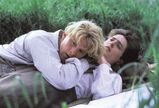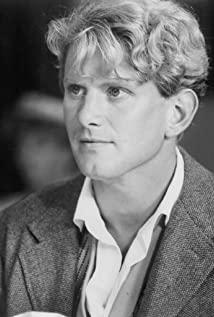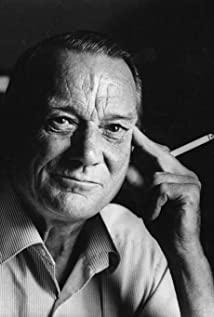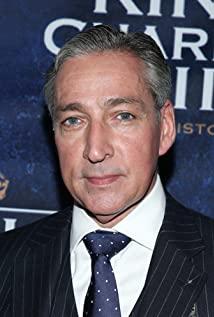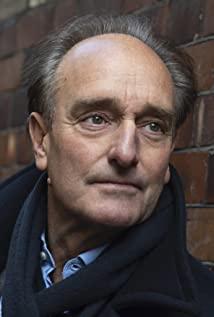"Let's take a look at the scenery! You can shoot rabbits directly from the window!" The thin black-haired young man picked up his best friend who was visiting his home for the first time from the bed and walked to the window.
Outside the window at that time, lush green plants and a small and regular fountain pool were a typical British manor landscape. And the story of the whole movie is like a landscape slowly unfolding around the windows. In Cambridge, when Maurice and Clive confided their feelings to each other for the first time but failed to confirm their feelings, Maurice climbed into the lover's room from the window late at night, relieved the stagnation in each other's chest with the briefest confession and kiss, and concluded the bond that followed. Years later, when Clive said, "Don't you think it's better that it's over?" Maurice opened the window again, but just let the rain wash over her body. In the end, Alec was the one who jumped in, allowing Maurice and herself to live as a complete flesh and blood.
The windows separate and connect the interior and exterior, artificial and natural environments. Director James Ivory never hesitated to use the lens to capture the natural scenery, and use this scenery to set off the beauty of human nature. From the golden wheat fields and ponds in the shade of "A Room with a View", to the waterfalls, mountains and rivers, country roads (and peaches...) in "Call Me by Your Name" (Ivory is the screenwriter and producer) , the emotional throbbing of the protagonists complement each other with natural elements and charming scenery. And the film, as always, gives nature a virtue of the highest good.
Young Maurice and Clive had a great love for nature and the outdoors. The motorcycle ride on the outskirts of Cambridge and the galloping horse in the Pendersleigh Manor are full of fond memories of the two. However, as the story progresses, Clive gradually moves away from nature ("far too busy canvassing!") and from the real emotional world. For him, the meaning of a manor has gradually changed from a natural space to a guarantee of wealth, real estate, social status and career. I still remember that when Maurice first arrived at the manor to meet Clive's mother, the young man who decided to drop out of school to join the stock market directly wanted to shake hands with each other, while Mrs Durham hesitated for half a minute before handing it over, as if the old fashioned kissing etiquette between high-class people. The gesture and the visitor reluctantly held. The conservative and arrogant temperament of traditional country gentry families emerges from this detail. And Clive chose to inherit and continue this family atmosphere and social role. So he kissed Maurice like his mother, and like his father, accepted a marriage of the right kind, and learned to be a magistrate—a small farmer, a tenant, and a domestic servant on that side of the territory feudal patriarch (compare Maurice's "I'm not my father!" when she defied her mother's order to go to church).
But can Pian An be absolutely safe and comfortable in the framework set up by the parents? Perhaps no one knows a negative answer better than Clive, especially when he asks, "Why is my house falling down?" in a self-deprecating tone. That night, the forces of nature allowed rain to drip through the seemingly solid stone edifice. In the face of this power, Clive just escaped, just as he escaped the "erosion" of his nature. His family members just perfunctory questions above their heads, turned around and left. But Maurice stretched out her hand, faced the impasse with the servants, and threw herself into the rain outside the window that night. He didn't know that Alec was soaking in the rain too, looking at him with glowing eyes like a beast in the woods. Afterwards, the boy, together with Yulu Sisha, crossed the window to meet Maurice. The drizzle, the moonlight, the breeze, and the lust of those few nights, together, performed a natural baptism for the two (it's funny, just before the scene where the two met, the priest was discussing with Mrs Durham about practicing religion for Alec the matter of baptism).
Since then, on the cricket field, the image of Alec and Maurice can not help but remind people of the juvenile and adult men on the ancient Greek sports field. And the love of men in ancient Greece is the same passion that made Maurice dazed in Cambridge classrooms many years ago. Clive, who was late for the game due to his work, seemed to sense the delicate atmosphere between Alec and Maurice, so he eagerly left the field to try his hand. But he was no longer the young man who had followed the ancient Greek philosophers in exalting physical, moral and intellectual beauty. Today, Clive is too far from his school dormitory where the ancient Greek pottery is placed, and the River Cam where he is boating with his best friend. Clive's first and last mentions of Plato in the film also form a contrast and irony to each other. The first time he talked about the "Symposium", he believed that the ancient Greek philosophers were talking about the emotions of body, mind and mind. The second time, if there is any intimacy between the two men, it can only be a "purely Platonic" love that excludes sensuality - which is exactly what he and Risley said when they teased Maurice earlier on the boat Tenth -hand opinion/ one of all sorts of interpretations - the hypocritical interpretation of Plato by later Taoists. What is even more embarrassing is that perhaps it was in Clive's grand tour, in the once dreamed Greek landscape, that he decided to bid farewell to the ancient Greek pursuit and Maurice as a lover.
Compared with Clive at that time, although Maurice failed to witness the ruins of civilization, he learned and practiced its spirit by reading classics and teaching boxing. Recall that shortly after the film opens, Maurice argues that actions are more important than words. And what he admires most about Alec is undoubtedly the latter's actions - Alec has never thought about the relationship between body, mind and soul like cultivated gentlemen. Wandering, lingering in the woods, waiting desperately at the water's edge, like a child who has not yet tasted the fruits of civilization that endow human beings with both wisdom and shame. So when he petted the five-legged Assyrian lion reliefs in the British Museum, wondering how they were made, when he begged Maurice to be with him at once, when he questioned the latter about the importance of his business, that This kind of innocent and serious, happy and painful, stubborn and wronged look is particularly moving [1].
And the author of the novel, EM Forster, is determined to make this love that transcends gender and class eternal. He wrote in a postscript to the work: "A happy ending is crucial. I can't imagine any other situation. I have decided that two men should fall in love and be in love forever, at least in fiction. within the permissible range."[2] The ending of the film continues the writer's wish. The two youths hugged tightly in the houseboat and whispered: Nothing can separate us anymore. But viewers may also feel that this eternal joyous atmosphere can only exist in a fictional world. The phrase "it is said that there will be a war soon" in the movie is an understatement and a worrying outline of the dark clouds of World War I, which are already densely covered in the real world at this time.
From this point of view, the novel or the film itself is like a window, which separates and connects memory and imagination, reality and fantasy. Beyond the fictitious ending shimmering with human hope, lies a looming cruel reality. In this reality, countless young men would be forced to leave Old England, go to the front lines, and end up in the Somme Valley, Gallipoli, Jutland, and the battlefields of all continents. Just like the final movement of Tchaikovsky's sixth symphony Pathétique , after the sweetness of the second chapter and the agitation of the third chapter faded, the void echoed with a dead silence. Just look back at what Clive said when he played this symphony with Maurice: "You can't play [the third part] again, it's a movement that has to be played to the end..."
A prophecy - history will follow its own trajectory, has been playing coldly to the end. In the final scene of the film, Clive closes the window and watches as Maurice fades away in his memories, like EM Forster watching a generation of youthful glory in the Edwardian British Empire die with the war. Yes, lurking outside the windows of fictional space, automated killing machines have been quietly loaded in reality, waiting to unleash a relentless shooting. Later, people will see patches of bright red poppies blooming in the British Isles, as if a little blood stain on the lips of a young man long ago smudged the landscape between heaven and earth. What an ending!
Notes
[1] When Maurice's enlightenment teacher, played by Simon Callow, appeared in the museum, he felt like Mr Beebe in "A Room With a View" possessed.
[2] “A happy ending was imperative. I shouldn't have bothered to write otherwise. I was determined that in fiction anyway two men should fall in love and remain in it for the ever and ever that fiction allows…” (EM Forster , Terminal note of Maurice.)
I might need to read the original to figure out what to do...
View more about Maurice reviews


